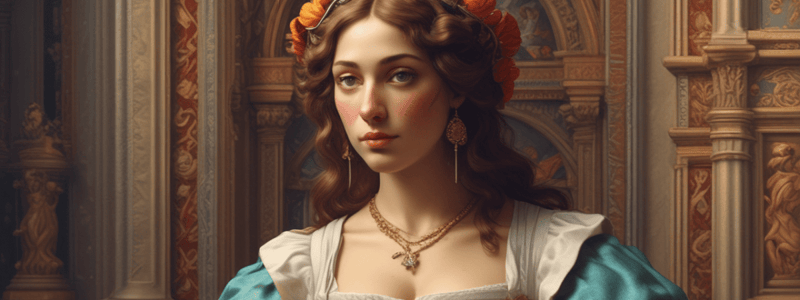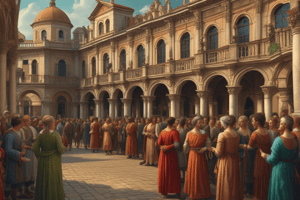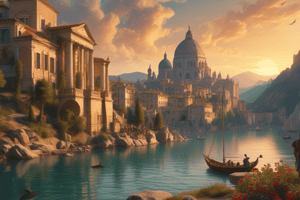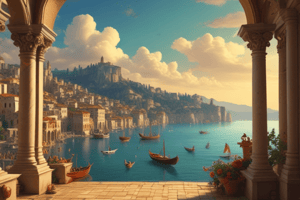Podcast
Questions and Answers
Which Italian artist was known for creating the dome of the Florence Cathedral during the Early Renaissance?
Which Italian artist was known for creating the dome of the Florence Cathedral during the Early Renaissance?
- Leonardo Da Vinci
- Titian
- Filippo Brunelleschi (correct)
- Michelangelo
Who painted the ceiling of the Sistine Chapel in Rome during the High Renaissance?
Who painted the ceiling of the Sistine Chapel in Rome during the High Renaissance?
- Titian
- Donatello
- Raphael
- Michelangelo (correct)
What marked the late Renaissance period?
What marked the late Renaissance period?
- Protestant Reformation
- Mannerism artistic style
- Development of heliocentric model (correct)
- Creation of printing press
Who was the most influential artist in the Holy Roman Empire during the Northern Renaissance?
Who was the most influential artist in the Holy Roman Empire during the Northern Renaissance?
Which dynasty coincided with the Northern Renaissance in England?
Which dynasty coincided with the Northern Renaissance in England?
'Vitruvian Man' is a famous work by which artist from the Renaissance?
'Vitruvian Man' is a famous work by which artist from the Renaissance?
'Renaissance ideas spread to this region of the continent, as well.' Which region is being referred to here?
'Renaissance ideas spread to this region of the continent, as well.' Which region is being referred to here?
'Copernicus' development of the heliocentric model of the Solar System was the most notable.' In which period did this event occur?
'Copernicus' development of the heliocentric model of the Solar System was the most notable.' In which period did this event occur?
'The greatest writer from this period was Shakespeare.' Which period is being referred to here?
'The greatest writer from this period was Shakespeare.' Which period is being referred to here?
'Italy remains a popular destination for artists seeking inspiration from both the ancient world and the great Renaissance masters.' Which era is highlighted in this statement?
'Italy remains a popular destination for artists seeking inspiration from both the ancient world and the great Renaissance masters.' Which era is highlighted in this statement?
Flashcards are hidden until you start studying
Study Notes
Italian Renaissance Timeline
- The Italian Renaissance occurred from 1300 to 1600, a period of cultural and intellectual renewal in Europe.
- The Renaissance began in Italy, specifically in Florence, after the Black Death (1347-1351) and was characterized by artistic creation, intellectual renewal, and cultural transformation.
Renaissance Events and Culture
- The Renaissance was marked by a revival of classical Greek and Latin texts, with scholars seeking to emulate ancient Roman writers.
- Humanism, a philosophy that put man at the center of artistic creation and scholarship, emerged during this period.
- The Renaissance saw the rise of art, sculpture, and architecture, with artists like Michelangelo and Leonardo Da Vinci creating iconic works.
- The period was also marked by wars, including the 100 Years' War, French Wars of Religions, 80 Years' War, and 30 Years' War.
Contributing Events
- The Crusades (11th-15th centuries) brought Europeans into contact with Middle Eastern merchants, leading to an international trade boom.
- The Black Death (1347-1351) killed up to half of Europe's population, leading to an increase in concentration of wealth and a shift in power dynamics.
Renaissance Dates and Subperiods
- The Renaissance occurred simultaneously with other historical periods, including the Elizabethan Era, Age of Exploration, and Protestant Reformation.
- The Proto-Renaissance (1300-1425) saw the emergence of early Renaissance art and the beginning of the 100 Years' War.
- The Early Renaissance (1425-1490) was marked by the invention of the printing press and the influx of Byzantine scholars into Italy.
- The High Renaissance (1490-1530) was the era of Michelangelo, Da Vinci, and other renowned artists.
- The Late Renaissance (1530-1600) saw the diffusion of Renaissance ideas to other parts of Europe and the emergence of the Baroque period.
Regional Variations of the Renaissance
- The Northern Renaissance (1485-1603) occurred in England, Scandinavia, the Holy Roman Empire, and France.
- The Northern Renaissance was characterized by the rapid diffusion of knowledge via the printing press and the emergence of notable writers like Shakespeare.
- The Renaissance in Eastern Europe was marked by the spread of Renaissance ideas and the emergence of notable figures like Copernicus.
What Happened After the Renaissance?
- The Renaissance paved the way for subsequent eras, including the Scientific Revolution and the Enlightenment.
- Renaissance artists and scholars laid the groundwork for future scientific and philosophical developments.
Studying That Suits You
Use AI to generate personalized quizzes and flashcards to suit your learning preferences.




